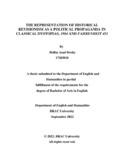| dc.contributor.advisor | Mohammad Noman, Dr. Abu Sayeed | |
| dc.contributor.author | Drohy, Bidita Azad | |
| dc.date.accessioned | 2023-08-08T09:58:17Z | |
| dc.date.available | 2023-08-08T09:58:17Z | |
| dc.date.copyright | 2022 | |
| dc.date.issued | 2022-09 | |
| dc.identifier.other | ID: 17203018 | |
| dc.identifier.uri | http://hdl.handle.net/10361/19364 | |
| dc.description | This thesis is submitted in partial fulfillment of the requirements for the degree of Bachelor of Arts in English, 2022. | en_US |
| dc.description | Cataloged from PDF version of thesis. | |
| dc.description | Includes bibliographical references (pages 77-78). | |
| dc.description.abstract | In a world where gaining power over others is the ultimate motivation and holding that power is the biggest
achievement, it is no wonder that a whole nation can be handicapped by a clique of ruling class people.
Governance is meant to be an act of supervision from a neutral position to keep the society under regulation,
authorize economic activities and ensure both the national and international security of the citizens.
However, politics have led the act of governance to the point where it only has negative connotations like
fear, dictatorship, oppression, etc. Unless governance is only an umbrella term to satisfy epistemological
expectations and hide the real intent of gaining power behind the promises. It is similar to the idea of
historical revisionism. Revisionism is an unavoidable academic procedure to fathom various areas in the
domain of history and then inspect the wrongs of the past. However, it also hides the deceptions/lies of
politicians as well as their ideologues, under these promises. When a tyrannical governance system
coincides with an escapist society, it creates a dystopian reality where history is abused for the advantages
of the ruling class/state power and the abuse is normalized and even hailed by the majority of population.
1984 by George Orwell and Fahrenheit 451 by Ray Bradbury portrays this situation through their imaginary
futuristic worlds. This paper seeks to decipher the warnings in Ray Bradbury and George Orwell’s
representation of historical revisionism in their respective novels. It attempts to examine the state power’s
objectives to abuse history as a propaganda, with the help of the theories of totalitarianism. Moreover, the
position of the society has also been analyzed from the perspective of the Marxist theory of class and
Gramsci’s theory of hegemony. Even though the totalitarian states in 1984 and Fahrenheit 451 are
imaginary, it is necessary to understand that they are inspired by real historical events. Hence, the possibility
of a totalitarian regime’s emergence can never be entirely disregarded. Moreover, it does not matter whether
it is a totalitarian system or a democratic system. As long as the society treats knowledge only as a source
of power and profit, it will keep being used as a political propaganda. Therefore, dystopias warn us against the manipulation of knowledge to seek power. And also, the escapist mentality of a society which leads
them towards destruction instead of eternal pleasure. | en_US |
| dc.description.statementofresponsibility | Bidita Azad Drohy | |
| dc.format.extent | 78 pages | |
| dc.language.iso | en | en_US |
| dc.publisher | Brac University | en_US |
| dc.rights | Brac University theses are protected by copyright. They may be viewed from this source for any purpose, but reproduction or distribution in any format is prohibited without written permission. | |
| dc.subject | Historical revisionism | en_US |
| dc.subject | Political propaganda | en_US |
| dc.subject | Classical dystopias, 1984 | en_US |
| dc.subject | Fahrenheit 451 | en_US |
| dc.subject.lcsh | Historical fiction, American--History and criticism. | |
| dc.subject.lcsh | Postmodernism (Literature)--United States. | |
| dc.subject.lcsh | Propaganda | |
| dc.title | The representation of historical revisionism as a political propaganda in classical dystopias, 1984 and Fahrenheit 451 | en_US |
| dc.type | Thesis | en_US |
| dc.contributor.department | Department of English and Humanities, Brac University | |
| dc.description.degree | B.A. in English | |

